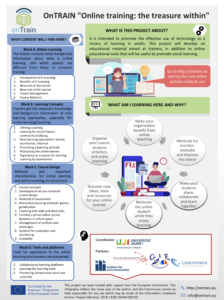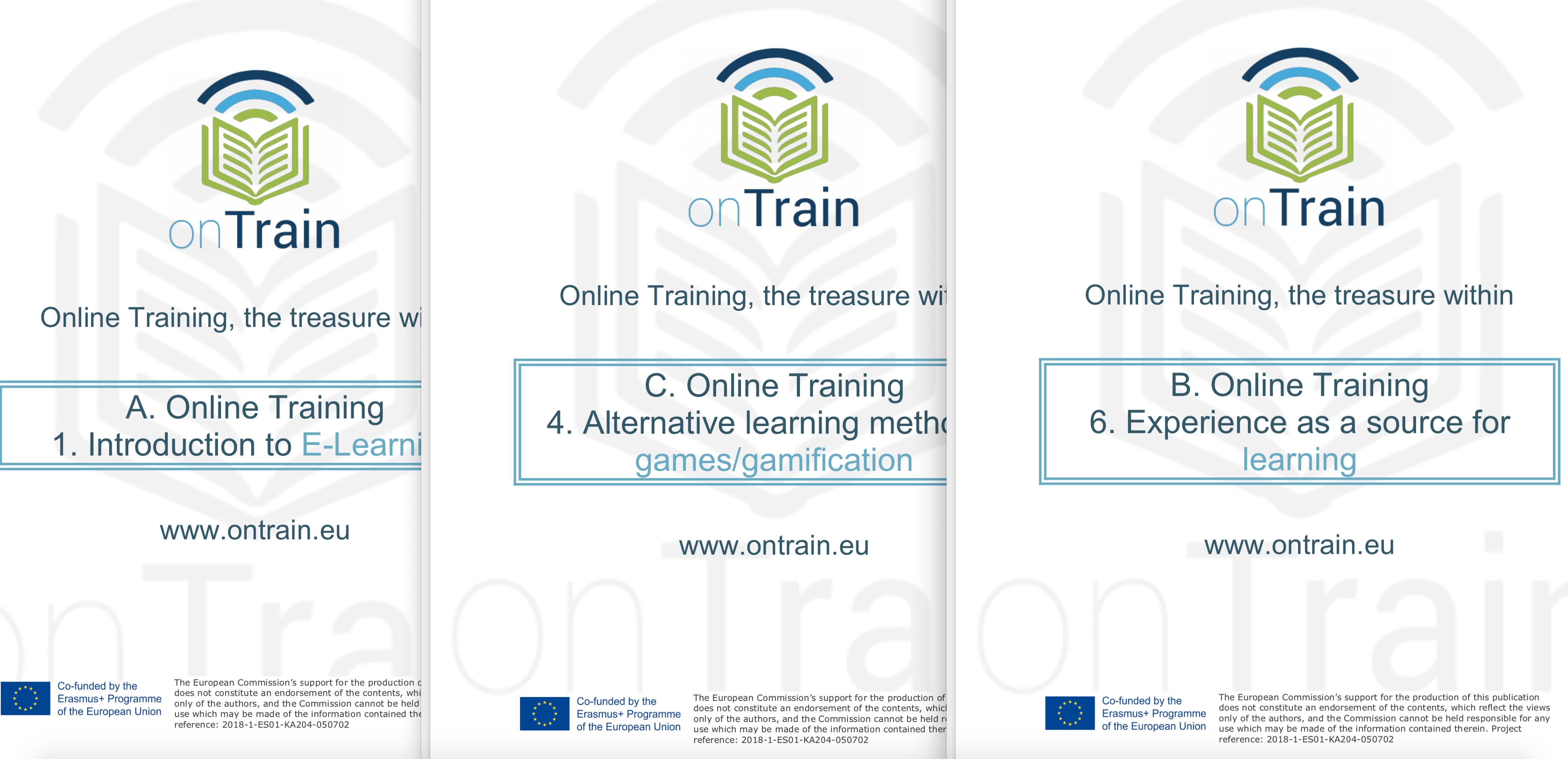There are 15 units available now. These are part of the educational material aimed at trainers. In these there are the following titles, and you can download each one of these:
BLOCK A: Online Learning
- Introducing to E-Learning: Difference between e-learning and blended learning, and between synchronous and asynchronous communication in online environments. Advantages and disadvantages both learning forms have.
- Benefits of E-Learning: The pros and cons of e-learning, and recognise and take advantage of the e-learning potentialities.
- New role of the trainer: Able to understand that online knowledge transfer is different from that in a normal classroom. Different roles of an online trainer and the tasks associated with teaching online.
- New role of the online learner: The learner's role is constantly changing adapt to the new technologies. Also know what the tasks are and which functions learners have in online environments. Different types of learners self-regulated learning, and are able to use these information for their own online-learning experience.
- Course Management: The learner get to know how to create an online course concept according the ADDIE-Model. At the end the online trainer is able
 to create well-prepared and motivating learning materials.
to create well-prepared and motivating learning materials. - Course Material: Learn more about reparing and structuring texts and images in online learning materials and know about the different features and effects.
BLOCK B: Learning Concepts
- Lifelong Learning: Concept of lifelong learning, information on the key actions implemented at European level for its dissemination, a reflection on the importance of lifelong learning and digital competences. Understand how digitisation is affecting the daily life of all of us, young and old, and how to make learners recognise the important role of lifelong learning in their lives.
- Learning for social impact - Community building: Learning community and its basic principles.
It is a mainly theoretical section where you will find definitions, historical background and characteristics of it. Introduction to the relationship between technologies and learning communities. - New learning approaches: formal, non-formal, informal
- Promoting a learning attitude
- Motivating the online learner: The future online trainer, the importance and significance of motivation in online learning scenarios. Prospective online trainer knows what role motivation plays in e-learning, the learner has to be activated to achieve positive learning results and what the relation is between motivation and interactivity.
- Experience as a source for learning: Principles and advantages of this approach: learning through learners’ experiences. Andragogical principles as a foundation to experiential learning, what kind of activities promote this approach and how to use them in class.
- Learning by experiences:
BLOCK C: Course Design
- Course concept
- Development of user-centered course design
- Methods of assessment
- Alternative learning method:games/gamification: Able to define the key notion: gamification. How to analyze and evaluate the methods and techniques of gamification, from the perspective of applying to your discipline and you will be able to develop, for a specific subject-matter, a didactic strategy based on gamification.
- Teaching soft skills and hard skills: Able to define soft skills and hard skills and know the difference between them. Able to identify different types of communication, to recognize communication barriers and how to deal with them.
- Forming a group online/group dynamics in virtual space: Able to analyse and evaluate the methods and techniques of group development. Able to recognize different aspects of forming a group and to explain the 5 stages of group development. How to identify the type of groups and to describe the group roles.
- Management of conflicts/challenges: Able to describe different types of conflict. Identify the causes of the conflict and how to manage the conflict using different strategies. Discover the positive aspects of conflict and able to explain the role of communication in conflict management.
- Systems for evaluation and monitoring
- Scalability: Learn more about the principles and advantages of online instruction. Know what the benefits of online courses are and be able to further using it when developing your online courses from the perspective of scalability and reuse. The prime example: MOOCs. Also, a first insight into Intelligent Tutorial Systems (ITS).
BLOCK D: Tools and Platforms
- Collaborative learning platforms
- Learning the learning tools
- Promoting collaborative work and creativity
Those content can be useful for you if you wish to apply online teaching in your courses and educational activities on adults and seniors. These content just published you will learn the basic concepts about eLearning, how to apply educational methods, and some practises and activities. Soon we will publish other content and free ICT-based tools, if you want us to keep you updated, contact us: info@ontrain.eu



Leave A Comment